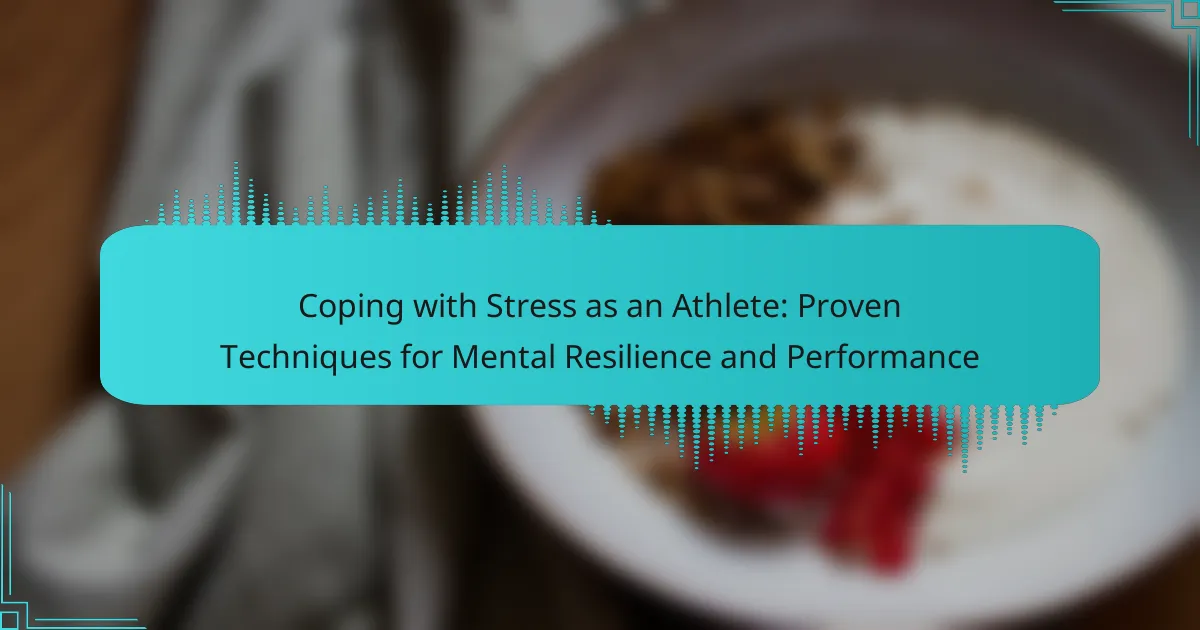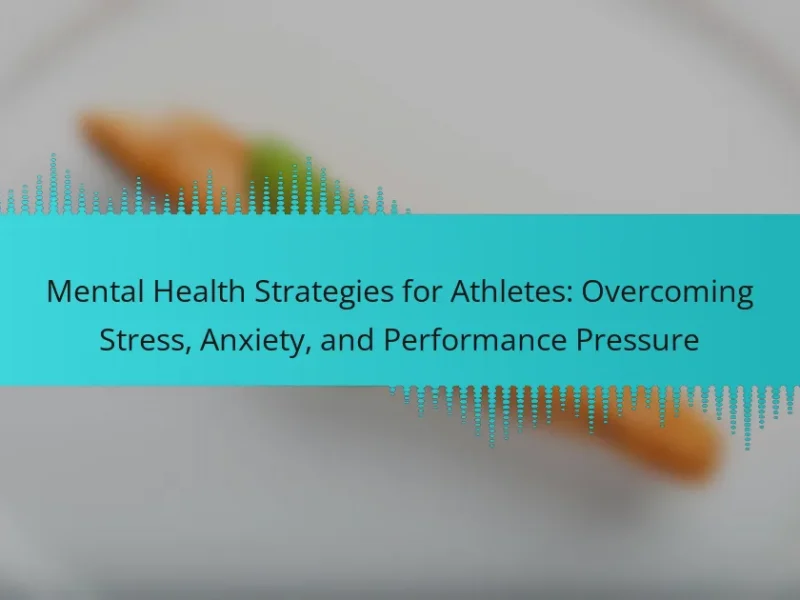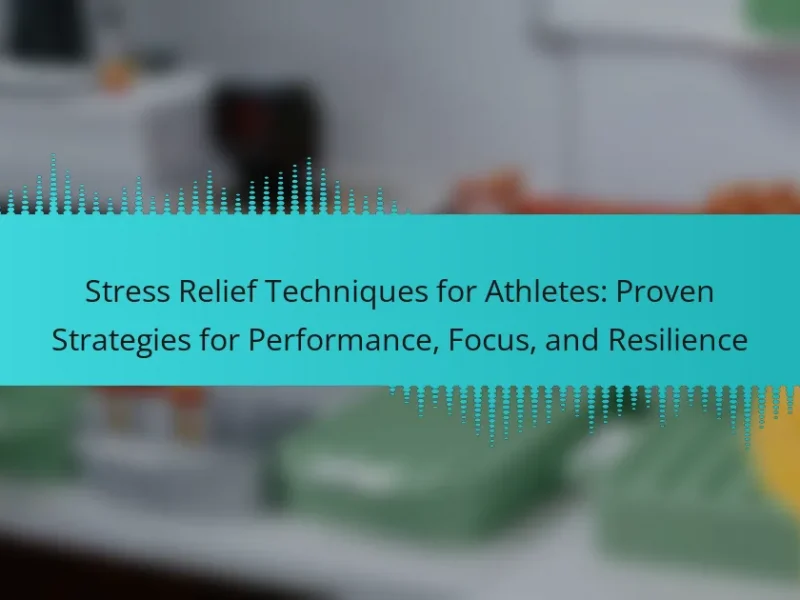Athletes often face significant stress that can hinder their performance. Proven techniques such as mindfulness, visualization, and controlled breathing can enhance mental resilience. These strategies help improve focus, reduce anxiety, and build confidence. Additionally, developing a growth mindset and establishing a support network are essential for long-term success.
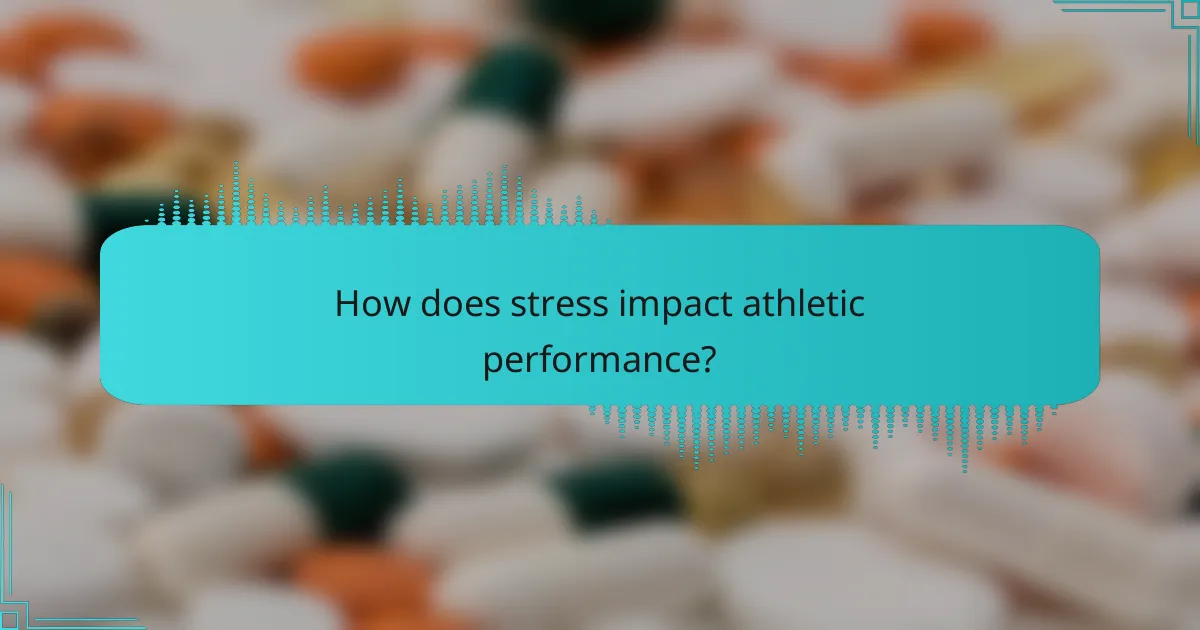
How does stress impact athletic performance?
Stress negatively impacts athletic performance by reducing focus, increasing fatigue, and impairing decision-making. Athletes can employ techniques such as mindfulness, visualization, and controlled breathing to enhance mental resilience. Research shows that mindfulness can improve concentration and overall performance under pressure. Visualization techniques help athletes mentally rehearse successful outcomes, boosting confidence. Controlled breathing reduces anxiety and calms the nervous system, allowing for better performance. Implementing these strategies can help athletes manage stress effectively and maintain peak performance levels.
What are the common sources of stress for athletes?
Athletes commonly experience stress from competition pressure, training demands, injury concerns, and performance expectations. These sources can significantly impact mental resilience and overall performance.
Competition pressure arises from the need to succeed against peers. Training demands include rigorous schedules that can lead to physical and mental fatigue. Injury concerns create anxiety about potential setbacks. Performance expectations stem from personal goals and external demands, which can intensify stress levels.
Recognising these stressors is crucial for developing effective coping strategies that enhance mental resilience. Techniques such as mindfulness, visualization, and support systems can mitigate stress and improve performance outcomes.
How does anxiety manifest in athletes during competition?
Anxiety manifests in athletes during competition through physical symptoms, cognitive distortions, and emotional responses. Physical symptoms include increased heart rate and muscle tension. Cognitive distortions may involve negative self-talk and fear of failure. Emotional responses often lead to heightened stress and decreased focus. Recognising these manifestations is crucial for developing coping strategies. Techniques such as mindfulness, visualization, and controlled breathing can enhance mental resilience and performance.

What are effective universal coping strategies for athletes?
Effective universal coping strategies for athletes include mindfulness, visualization, and structured routines. These techniques enhance mental resilience and optimise performance under pressure. Mindfulness practices help athletes stay present, reducing anxiety. Visualization techniques allow them to mentally rehearse successful performances, boosting confidence. Structured routines provide a sense of control, helping athletes manage stress effectively. Utilising these strategies can lead to improved focus and overall well-being in high-stress situations.
How can athletes use breathing techniques to manage stress?
Athletes can effectively manage stress through breathing techniques by enhancing focus and reducing anxiety. Techniques such as diaphragmatic breathing promote relaxation and improve oxygen flow, which can enhance performance. Practising these techniques regularly can lead to better mental resilience during competitions. Incorporating structured breathing exercises into training routines can help athletes develop a reliable tool for stress management.
What role does physical exercise play in reducing anxiety?
Physical exercise significantly reduces anxiety by promoting the release of endorphins and improving mood. Regular physical activity lowers stress hormones and enhances overall mental resilience. Studies show that athletes experience reduced anxiety levels due to structured training routines and social support. Engaging in exercise can serve as a unique coping mechanism, providing athletes with a sense of control and accomplishment.
How can time management help in coping with stress?
Effective time management significantly reduces stress for athletes by creating structure and enhancing focus. Prioritising tasks allows athletes to allocate time wisely, reducing the feeling of being overwhelmed. This structured approach fosters mental resilience, enabling athletes to perform optimally under pressure. Studies show that athletes who manage their time effectively report lower stress levels and improved performance outcomes.
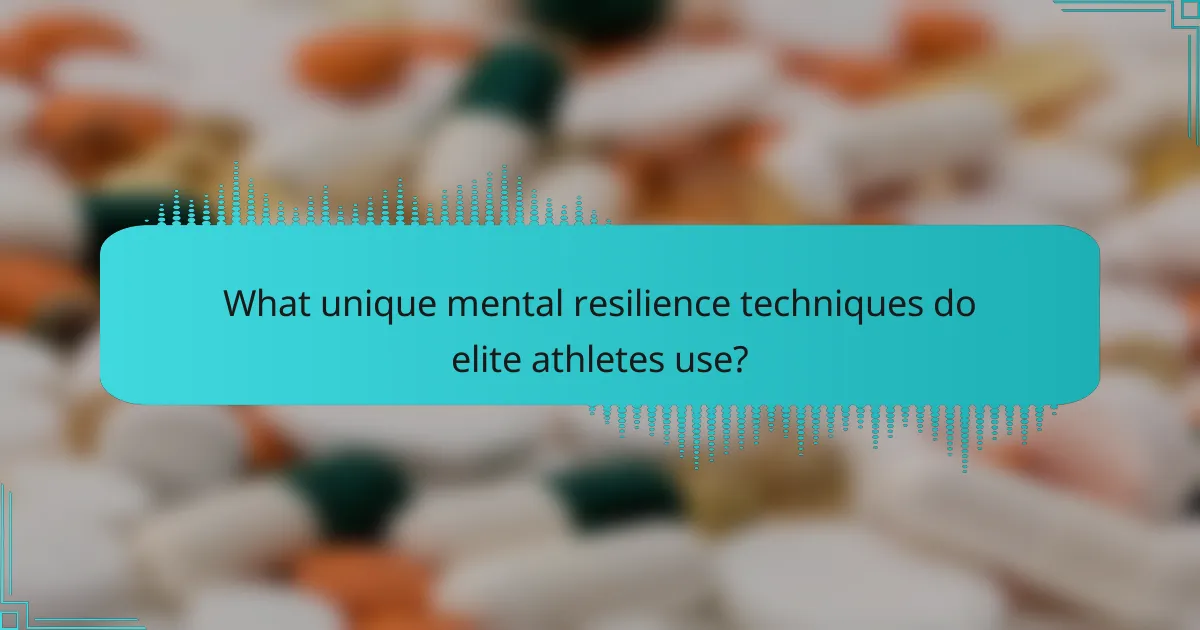
What unique mental resilience techniques do elite athletes use?
Elite athletes employ unique mental resilience techniques such as visualization, mindfulness, and positive self-talk. These strategies enhance focus, reduce anxiety, and improve performance under pressure. Visualization helps athletes mentally rehearse their performance, while mindfulness promotes present-moment awareness, reducing distractions. Positive self-talk fosters confidence and resilience, enabling athletes to overcome challenges.
How can visualization techniques enhance performance under pressure?
Visualization techniques significantly enhance performance under pressure by improving focus and reducing anxiety. These techniques allow athletes to mentally rehearse successful outcomes, which can lead to increased confidence. Research indicates that visualising specific scenarios can activate similar brain regions as actual performance, enhancing muscle memory and reaction times. As a result, athletes can maintain composure and execute skills more effectively during high-stress situations.
What is the importance of goal setting in stress management?
Goal setting is crucial in stress management for athletes as it provides clear direction and motivation. Establishing specific, measurable, achievable, relevant, and time-bound goals helps athletes focus their efforts and reduce anxiety. Research indicates that athletes who set goals experience lower stress levels and improved performance. Furthermore, goal setting fosters a sense of control, enabling athletes to navigate challenges effectively. By regularly reviewing and adjusting their goals, athletes can maintain mental resilience and adapt to changing circumstances, ultimately enhancing their overall performance.

What rare coping mechanisms have been effective for some athletes?
Some rare coping mechanisms effective for athletes include visualization, controlled breathing, and sensory deprivation. Visualization involves mentally rehearsing performance scenarios to enhance focus and confidence. Controlled breathing techniques help regulate stress responses, promoting calmness during competition. Sensory deprivation, such as floatation therapy, allows athletes to reduce external stimuli and enhance mental clarity. These methods contribute to mental resilience and improved performance under pressure.
How can journaling contribute to mental resilience?
Journaling enhances mental resilience by providing athletes a structured outlet for emotions and stress. It fosters self-reflection, allowing athletes to process experiences and identify coping strategies. Regular journaling can improve focus and clarity, facilitating better performance under pressure. Studies show that expressive writing reduces anxiety and enhances emotional regulation, key attributes for athletes facing competitive stress.
What unconventional methods have athletes used to cope with anxiety?
Athletes have employed various unconventional methods to cope with anxiety, including visualization techniques, breath control exercises, and unconventional therapies like art and music therapy. These approaches enhance mental resilience and performance by promoting relaxation and focus. For example, visualization helps athletes mentally rehearse their performance, reducing anxiety. Additionally, breath control exercises can lower stress levels and improve concentration. Integrating art or music therapy allows athletes to express emotions creatively, providing a unique outlet for stress relief.
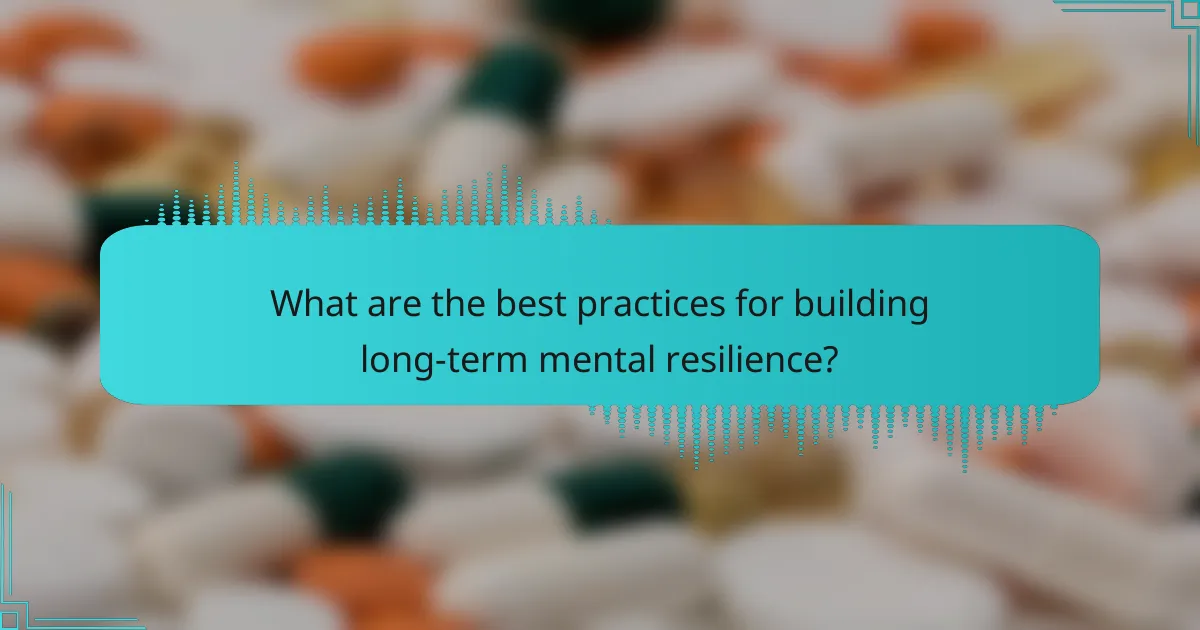
What are the best practices for building long-term mental resilience?
Building long-term mental resilience as an athlete involves consistent practice of specific techniques. Focus on developing a growth mindset, which fosters adaptability and learning from setbacks. Incorporate mindfulness practices, such as meditation, to enhance self-awareness and emotional regulation. Establish a strong support network, including coaches and teammates, to provide encouragement and accountability. Regularly set achievable goals to maintain motivation and track progress. Lastly, prioritise recovery strategies, including adequate rest and nutrition, to sustain mental and physical performance.
How can athletes create a personalized stress management plan?
Athletes can create a personalized stress management plan by identifying triggers, setting specific goals, and incorporating effective techniques. Start by assessing stressors, such as competition pressure or training demands. Next, establish realistic objectives for managing stress levels. Techniques may include mindfulness practices, breathing exercises, and physical activity. Regularly review and adjust the plan based on performance feedback and emotional responses. This tailored approach enhances mental resilience and overall performance.
What common mistakes should athletes avoid in stress management?
Athletes should avoid common mistakes in stress management, such as neglecting mental health, mismanaging time, and ignoring recovery. Prioritising physical training over mental resilience can lead to burnout. Failing to establish a routine can increase anxiety. Additionally, not seeking support from coaches or peers may hinder performance. Recognising and addressing these pitfalls enhances mental resilience and overall performance.
What expert insights can enhance coping strategies for athletes?
Expert insights can significantly enhance coping strategies for athletes by providing tailored techniques that improve mental resilience. Techniques such as mindfulness meditation, visualization, and cognitive-behavioral strategies have shown effectiveness in stress management. Research indicates that athletes who practice mindfulness report lower anxiety levels and improved focus during competitions. Visualization helps athletes mentally rehearse performances, boosting confidence and reducing pre-competition stress. Cognitive-behavioral strategies enable athletes to reframe negative thoughts, fostering a positive mindset. These insights empower athletes to develop personalized coping mechanisms, ultimately enhancing their performance and well-being.
